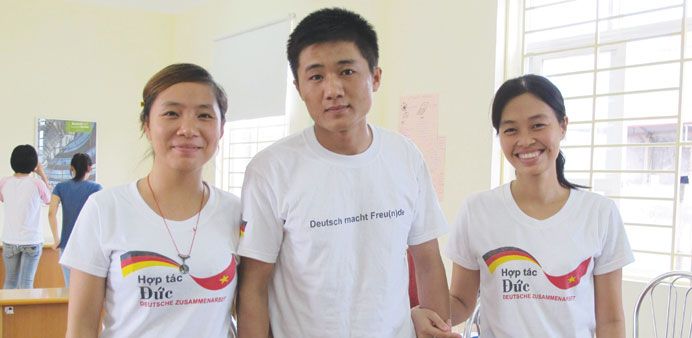DPA/Hanoi
Midway through recalling his experience caring for elderly people in a Hanoi hospital, 23-year-old Nguyen Huu Lai pauses for breath and his eyes fill with tears.
“One old man lived through the war and many things, and even now life is very hard for him,” he says.
Lai is among around 100 trainee nurses heading to Germany as part of a pilot training project run by the two governments and GIZ, a German development aid organisation, aimed to meet rising demand for geriatric care in the rapidly ageing European country.
The first of the nurses have already arrived in Germany, the rest are due to fly to Berlin later this month.
They take a six-month intensive language course before going to Germany for a two-year vocational programme. If they pass the nursing exam, they will receive the same salary as their German counterparts and can work in the country for three more years, after which they can choose whether or not they want to return home.
Germany is facing a demographic time bomb as the shrinking population gets older. Currently 20.9% of people living in the country are estimated to be over 65, and the number is expected to increase dramatically in the next few decades.
Demographic change is expected to cause an increasing number of people requiring care in Germany, from the current level of 2.3mn to approximately 3.4mn in 2030, according to the GIZ.
Experts are warning that there are not enough professionals to take care of the elderly, and skilled labour from other member states of the European Union — which have similar demographic trends — can’t cover the shortage.
“You have to take it very seriously when the federal employment agency tells us that there are 10,000 more possibilities for employment than unemployed persons (in the field of geriatric nursing). That means that there are many institutions in desperate need of additional workforce,” Dominik Ziller, director of general migration at GIZ, said during a trip to Hanoi.
The German government is bringing in 2,000 fully qualified nurses from Bosnia, Serbia, Tunisia and the Philippines, but they are not specialised in geriatric care, unlike the trainees from Vietnam, Ziller said.
In Vietnam, older people are held in high esteem and most children are expected to care for their elderly parents at home. This custom, as well as a youthful population — around 60% were born after 1975 —are part of the reason Vietnam was selected for the project.
However, diplomacy and history also played a role.
Before the fall of the Berlin Wall in 1989, East Germany had a close relationship with communist Vietnam and thousands of Vietnamese were sent there to work in factories and to study.
“From that period there are still many German-speaking people here in the (Vietnamese) ministries, probably in the age between 50 and 60 rather than the age of 30 and 40, who are very open towards Germany,” Ziller said.
Japan, which is growing older faster than any other country in the world, is also looking to Vietnam for geriatric nurses. Nearly 25% of its population is above the age of 65, and by 2060 that number could be as much as 40%.
Later this year, 150 Vietnamese candidates will go to Japan after first finishing a language course. They will spend two years training at a hospital before joining peers from the Philippines and Indonesia to sit the national nursing exam.
Only 9.6% of foreign applicants are reported to have passed the exam this year.
Yoko Tsuruya, first secretary at the Japanese embassy in Hanoi, said that although some oppose Japan’s increased intake of foreign labour - because of concerns it could lead to lower standards of work and increased unemployment in Japan - there is little opposition to foreign nurses.
“Not many people have opportunities to pass this exam, so the opposition against this kind of programme is less than the opposition for labour,” she said.
For those Vietnamese who do succeed in nursing abroad, there is the prospect of life in a developed country with a good salary.
However, the Berlin-bound Lai insists he is not motivated simply for his personal gain.
When his experience in Germany is over, Lai says, he would like return home to take care of his own parents.

